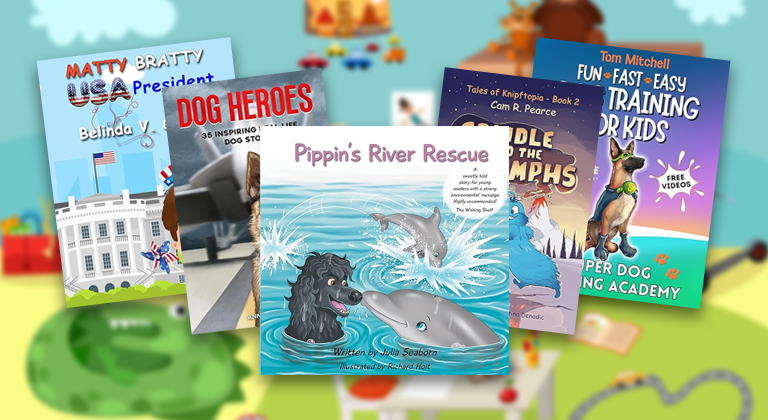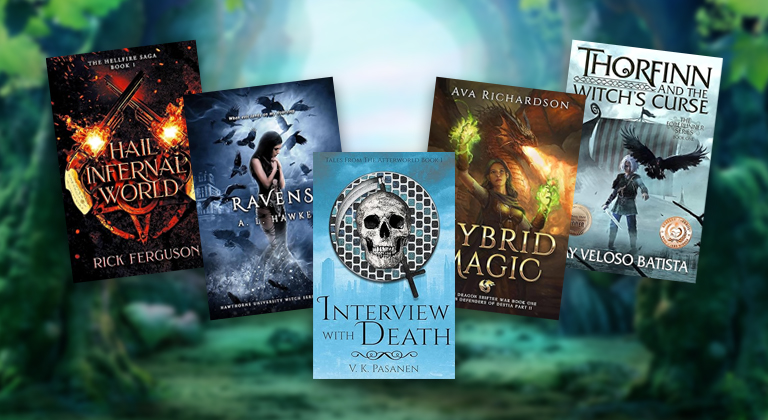How Short Story Writing Can Improve Your Novels
When you’re new to something, a common bit of advice is to start small and work your way up to bigger and better things. This applies to writers just as well as anyone else, and is the reason short story writing often comes before novels for many authors. Kate Larkindale understands first hand why this is good advice, and she’s here giving us all the reasons why writing short stories can make you a better novelist – whether you’re just beginning your career or already well established.
I wrote my first novel when I was still a teenager. Barely a teenager. I’d never written anything except stories for school before, and had no idea what I was doing. And the finished novel was a complete mess. So were the next two I attempted, and the fourth.
It wasn’t until I took a step away from pouring myself into novel after novel that I learned how to be a writer. And what taught me those valuable lessons was writing short stories.
Writing short fiction has many benefits for novelists, whether you’ve written your first novel or your fourteenth, not the least of which is that it helps you discover what you love about writing.
There are thousands of publications out there asking for stories in every genre from crime thrillers to romance to fantasy and beyond. Why not test your ability across a range of genres and styles? Find out what you truly love to write before you invest the hundreds of hours required to write a novel.
While I figured this out for myself, I wrote sci-fi, fantasy, horror, erotica, historical fiction and more. And throughout all this, I think I knew my heart was always going to be in YA, but I don’t feel at all like I wasted my time by writing more broadly. In fact, I think writing all those different genres helped me find my own unique voice because I tried so hard to change it when writing stories that weren’t wholly my own.
Short story writing is also a valuable tool for honing your craft in general. When a publication is asking for a story of only five, three or one thousand words, there’s no room for waffle. The story itself needs to be focused and crafted so it has a beginning, a middle and an ending. The writing must be powerful and evocative. In short fiction, every word must have a purpose and pull its weight. There is no room for flabby writing. Nor is there room for a cast of thousands or myriad subplots.
I like to keep this in the back of my mind when I’m editing longer works. Each chapter can be looked at like a short story, and each word in that chapter needs to push the story forward, not send it off into some dark alleyway with no exit in sight.
The scariest moment is the one when you know you’ve done as much to the story as you can, because where do you go next?
Your first time publishing feels like a big step, but writers write so they can be read, and a story hanging out on your hard drive is only going to be read by one person – you. Still, you want to put your best foot forward.
I’d jumped the gun with publishing and sent out a couple of those early, awful novels only to have them rejected, probably (hopefully?) unread.
Before submitting a story to a publication, it’s a good idea to take a look at some past issues of that publication to get a feel for what they like. It’s also a good idea to look at things like how often they publish new work, especially when it comes to online publications. A site that publishes a new story each day is going to need far more content than a publication that might only publish one piece of short fiction per month or quarter, so is probably an easier place to get accepted.
I’m not going to lie to you. Your story is very likely going to be rejected. But this isn’t a bad thing.
Publishing is full of rejection (I’ve logged over 200 rejections in my career), and if you’re serious about being a writer, it’s something you need to learn to deal with. And it’s way better to have a short story that may have taken a few days to write rejected than a novel that may have taken a few years. I’m not saying it won’t hurt, or that it won’t be disappointing, but after the first few times, it does get easier. Honestly. I wouldn’t lie to you.
And while your short is out in the world, waiting for its chance to shine in that literary journal or anthology, you can get to work on your next story. Or your novel. Just remember, the more publications you submit to, the more chance you have of getting published. Rejections are just one of the stepping stones along the way.
As well as toughening my hide against the pain of rejection, publishing short fiction helped me build some publishing credits. When querying a novel, having a publication history shows agents you’re serious about writing, and if you’ve been published in a well-known magazine or journal, it speaks to the quality of your writing. It also helps to build an audience for your long-form work. If readers have enjoyed a short story you’ve written, they may also like your novel. After reading the story, they might do some research to find out if you’ve written something else.
I don’t actually know for sure if any of the readers of my short stories have read my novels, or vice versa, but it’s certainly possible, right?
Which is a reason why it might be a good idea to continue writing and publishing short fiction even after your first novel is published and available. Writing a novel takes a long time, and readers may be impatient to hear from you again. Publishing short fiction keeps your name and your voice in the minds of your readers so they don’t forget you between novels.
Some publishers regularly compile anthologies of short or novella length fiction partly for this very reason – to keep their authors in the spotlight between novels. But also to discover new writers who might have unique and interesting voices. I’m lucky enough that my publisher is one of these, and this year I got to stretch my writing muscles with a novella-length story (Run to You) in an anthology of stories each of which started and finished with a kiss.
As a writer, I find writing short fiction is fantastic for keeping my writing tight. Novels give us the freedom to explore subplots and side characters and elaborate on worlds, but sometimes it’s valuable to go back to short fiction and try to get to the core of the story in as few words as possible. Once you get back into the habit of making every word count, it will transfer into your novel writing –making it stronger and tighter overall.
I’m currently working on a novel where each chapter is a 1000 word story based on a daily prompt given out on a writing website I’m a member of. The stories are entered into a daily competition, but for me, it’s not about the prizes or winning, but about pushing myself to write tight, concise chapters that drive the plot of my novel forward. That the prompts have thrown up some interesting curve balls in terms of plot elements and character quirks is just a bonus.
Writing short fiction as a published novelist is also an opportunity to explore new genres. I write primarily contemporary YA, but sometimes an idea springs into my head that’s different and doesn’t fit into that genre. Usually writing a short story around that idea is enough for me because they are usually pretty small, single-event ideas, but every now and then one demands to be something more. This is why there are so many half-finished novels hanging around on my hard-drive, and why I’ve written an entire historical romance novel that is unlikely to ever see the light of day.
These are just a few reasons why a novelist might want to consider taking short story writing more seriously. It might not be for you, but I can tell you it has been a very important and valuable part of my writing journey. And I’m pretty sure it will continue to be in the future, too.











